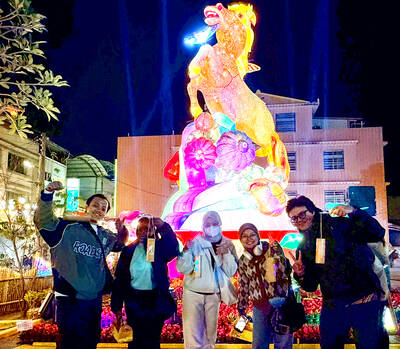Porcupines in cages, endangered tortoises in buckets and snakes in cloth bags — rare wildlife is on open sale at a Chinese market, despite courts being ordered to jail those who eat endangered species.
The diners of southern China have long had a reputation for exotic tastes, with locals sometimes boasting they will “eat anything with four legs except a table.”
China in April raised the maximum sentence for anyone caught selling or consuming endangered species to 10 years in prison, but lax enforcement is still evident in Guangdong Province.

Photo: AFP
照片:法新社
“I can sell the meat for 500 yuan (US$80) per half kilo,” a pangolin vendor at the Xingfu — “happy and rich” — wholesale market in Conghua told AFP. “If you want a living one it will be more than 1,000 yuan.”
The market was the subject of a Chinese media expose two years ago, when a local official told the state-run Beijing Technology Times that its role as a center for animal trafficking was an “open secret.”
The seller, who declined to be named, said making a living from his creatures was getting tougher. “Now it’s governed very strictly,” he said.

Photo: AFP
照片:法新社
On a recent morning traders were out in force, however, with hundreds of snakes writhing in white cloth bags and wild boars staring plaintively from wire cages.
Not all the produce is illegal but a huge sign touted giant salamanders, which are classed as critically endangered — one level below “extinct in the wild” — on the International Union for the Conservation of Nature’s Red List of threatened species.
Asian yellow pond turtles were up for sale beside porcupines, most likely from Asia where several species are also critically endangered.
Southern China has long been the center of a culinary tradition called “wild flavor,” which prizes parts of unusual wild animals including tigers, turtles and snakes as a route to health — despite the lack of orthodox scientific evidence proving such benefits exist.
Pangolins — scaly creatures which in the wild lick up ants with tongues longer than their bodies — are protected by the international wildlife trade treaty CITES, to which Beijing is a signatory.
In parts of China they are prized by new mothers hoping to produce milk and have become the focus of a vast smuggling industry stretching across Southeast Asia — estimated to traffic tens of thousands of the animals each year.
Beijing first enacted laws in 1989 forbidding trade in scores of creatures including the Chinese pangolin, but has long struggled to enforce the ban as a booming economy has boosted demand.
In April the country’s rubber-stamp parliament approved a new interpretation of the 1980s law which could see jail sentences of up to 10 years for those caught eating endangered animals, as well as for sellers.
Meanwhile, state-run media have publicized huge hauls of smuggled animals — with border police in Guangdong Province in May shown seizing 956 frozen pangolins, reportedly weighing four tonnes.
Jill Robertson, CEO of Hong Kong-based charity Animals Asia, described the enhanced penalties as a “positive step” but added that “enforcement must be strengthened, and public education and awareness greatly enhanced.”
(AFP)
籠裡豪豬、籃裡瀕臨絕種的陸龜與布袋裡的蛇—儘管法律明定吃保護動物是要坐牢的,但依然可見中國市場公開販售這些稀有野生動物。
中國南方饕客長久以來以享用奇特食材聞名,有時當地人甚至會以其「除了桌子不吃外,任何四隻腳的都來者不拒」而自豪。
中國在四月提高販賣或食用保護動物的刑期達十年,但在廣東省顯然執法不力。
一位從化市興富批發市場的穿山甲販子告訴法新社表示:「這肉我可以賣半公斤五百元人民幣(八十美元)。」他說:「若你要活的,價格將會超過一千元人民幣。」
該市場在兩年前在中國媒體上曝光,當時是一位當地官員向國營的《Beijing Technology Times》透露,該市場成為動物販賣的集散地已是「公開的秘密」。
該位不願具名的販子表示,以賣這些生物維生越來越困難。他說:「現在這管得非常嚴。」
然而,最近的某日早晨又有大批交易者竄出,交易市場上則可見上百隻蛇在白色布袋內蠕動,而鐵籠內野豬則哀怨地向籠網外凝視。
販售商品雖非全然違法,不過仍可見兜售巨型蠑螈的大型廣告標示。蠑螈被國際自然保護聯盟瀕危物種紅色名錄列為「極危物種」,也就是比「野外絕滅」少一級的絕種風險。
除了豪豬外,亞洲黃喉擬水龜也在現場販售。而豪豬則很可能來自亞洲,其許多種類也被列為極危物種。
在烹飪傳統上,中國南方長久以來是個「野味」大本營,當地居民視稀有野生動物包括老虎、烏龜與蛇等為養生珍寶—即便目前尚缺乏正統科學實驗證實其對健康的功效。
全身佈滿鱗片、以比其身體還長的舌頭在野外舔食螞蟻的穿山甲,是受到瀕臨絕種野生動植物國際貿易公約保護的動物,而中國還是該公約的簽署國。
然而在中國部分地區,該動物被哺乳媽媽視為珍寶,並已延伸成為遍及整個東南亞的大宗走私產業。估計每年有成千上萬的穿山甲被走私。
北京政府一九八九年首度立法禁止包含中國穿山甲等大量的動物交易,但因中國的好景氣帶動購買動物的需求,使其長期以來執法不易。
像是橡皮圖章的全國人大四月批准對於一九八零年代法律的一項新解釋,其中明令被查獲食用或販售保護動物,將可處以長達十年的刑期。
與此同時,國營媒體公布查獲大量走私動物—廣東省邊界警察五月展示其所查獲的九百五十六隻冷凍穿山甲,據報導重達四公噸。
香港亞洲動物基金行政總監綺兒‧羅賓森認為加重刑罰是「積極的一步」。但她補充道:「法律執行必須強化,並且公民教育以及保護動物意識也必須要大幅提升。」
(法新社/翻譯:林亞蒂)

A: Harvard professor Robert Waldinger’s “7-day Happiness Challenge” includes: Day 1: Take stock of your relationships; Day 2: The secret power of an 8-minute phone call; Day 3: Small talk with strangers has big benefits. B: That’s not too hard. What’s next? A: Day 4: Why you should write a “living eulogy;” Day 5: The importance of making work friends; Day 6: Don’t cancel those social plans. B: Good ideas. What’s the final challenge? A: Day 7: Keep happiness going all year long. So, I’m inviting some friends to the Taipei Lantern Festival today to build good relationships. Wanna

★ 本文由生成式 AI 協作,本刊編輯編修。 For tourists looking for a scenic way to spend an afternoon in Kaohsiung, heading to the British Consular Residence of Takao is the perfect choice. Its elevated position allows one to take in the bustling Kaohsiung Harbor to the east and the dazzling sunset over Sizihwan Bay to the west. This elegant red-brick building also serves as a portal to the city’s rich history. Interestingly, for 70 years, many people mistakenly identified this residence as the actual consulate. The history of “Takao,” the former name of Kaohsiung, began its international chapter in the mid-19th century. As European powers

★ Bilingual Story is a fictionalized account. 雙語故事部分內容純屬虛構。 The fog came before the knock. It covered the street and pressed against the window. Chao Gung-dao lit a small oil lamp, but his makeshift hut stayed dim. Another knock. Chao opened the door. The inspector stepped inside and removed his hat. He did not smile. “You remember me?” the inspector said. Chao resented the question. The inspector looked around the small room. His eyes stopped on a wooden box resting on a low beam above Chao’s head. “What is that?” Chao stayed silent. The inspector pulled the box down and

Every February, the US observes Black History Month, a time dedicated to recognizing the contributions, experiences, and achievements of African Americans. The tradition began in 1926, when historian Carter G. Woodson proposed a national week to promote the teaching of Black history in schools. He deliberately chose the second week of February to honor the birthdays of Abraham Lincoln and Frederick Douglass, two figures held in high esteem by the Black community for their roles in ending slavery. In 1976, the initiative expanded into a month-long observance, with then US president Gerald Ford urging Americans to acknowledge the accomplishments of